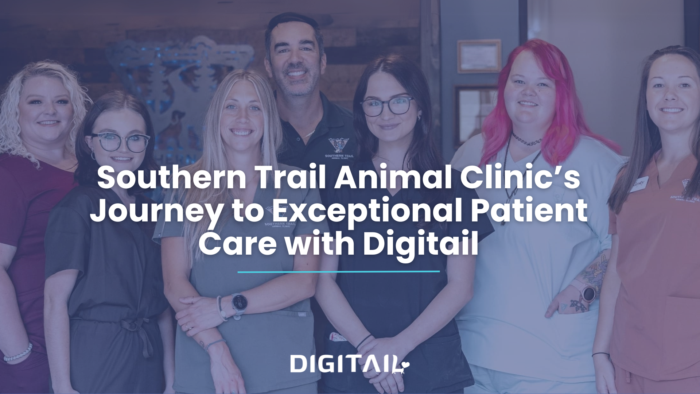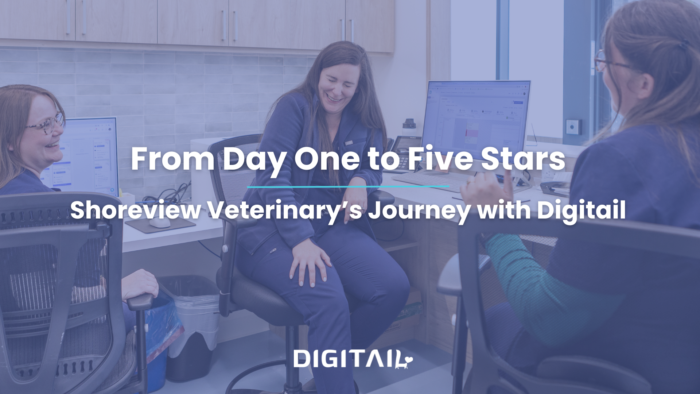
AI’s Impact on Veterinary Medicine and Professional Well-being
Could AI be the unsung hero of the veterinary industry?
It’s no secret that the veterinary industry, which is marked by high burnout rates, is on the cusp of a technological revolution. A recent survey conducted by Digitail in collaboration with the American Animal Hospital Association (AAHA) reveals a growing awareness and optimism among veterinary professionals regarding Artificial Intelligence (AI). According to this AI in Veterinary Medicine survey, 83.8% are familiar with AI and its applications, indicating a shift towards embracing technology to tackle industry-wide challenges.
Some of the most consistently mentioned concerns of veterinarians and other healthcare professionals in association with burnout, job satisfaction, and intent to leave are workload and time pressure.
Veterinarian burnout demographics and organizational impacts: a narrative review
Front. Vet. Sci., 04 July 2023
Sec. Veterinary Humanities and Social Sciences
AI Adoption: Transforming Veterinary Workflows
The survey underscores the varying degrees of AI adoption across the veterinary sector. While 39.2% of respondents have already integrated AI tools into their practice, 69.5% of these early adopters use AI technologies daily or weekly. This high frequency of use highlights AI’s potential to streamline operations and reduce burnout, offering a glimpse into a future where technology and veterinary care go hand in hand. This article will explore two ways veterinarians can utilize AI to reimagine workflows and provide more personalized care.
Since implementing Tails AI, I actually started receiving photos from our hospitals showing them with genuine smiles on their faces. Now, they actually get breaks and can close at 5, all while maintaining patient volume and excelling financially.
Dermot Jevens, Co-Founder and CEO AcharaVet
Listening and Transcribing: A Leap Towards Efficiency
Imagine the scenario – AI listening to exams, or recording dictation, transcribing, and automatically sorting records, liberating vets from hours of paperwork. This isn’t just a minor convenience; it’s a game-changer, reclaiming precious time for veterinarians.
We experimented with traditional voice-to-text tools, but they still required a lot of manual effort and accuracy checks. The introduction of Tails AI Dictation was a game changer. It just listens in the background, and by the end of the appointment, your SOAP notes are magically ready. No more late-night record filling at home.
Dermot Jevens, Co-Founder and CEO AcharaVet
In an industry where burnout has become the norm rather than the exception, introducing AI tools like Digitail’s Tails AI Dictation and Quick Soap sorting feature is nothing short of a miracle.
“Digitail’s Tails AI Dictation and Quick SOAP feature is the most significant update I’ve experienced in any practice management software. It allowed me to complete my notes before the end of a fully booked day! That NEVER happens.”
Dr. Douglas Crifranick, Owner/DVM WoofDoctor on Wheels
Breaking Down Barriers in Client Education and Communication

The survey highlights AI’s role in client education and patient record management as critical areas for positive impact. By facilitating access to accurate, comprehensible information, AI tools empower veterinary professionals to improve client communication and education, enhancing the overall care experience and offering tailored, accurate information at the touch of a button. No more one-size-fits-all pamphlets; we’re talking about personalized care instructions powered by AI.
Moreover, AI’s role in translation breaks down language barriers, ensuring that all pet owners, regardless of their primary language, receive the same high level of care and understanding. This inclusivity is vital for fostering trust and understanding between veterinarians and pet owners, further illustrating AI’s multifaceted benefits to the veterinary field.
Challenges and Opportunities in Navigating the AI Landscape
Despite the enthusiasm, the survey also highlights the barriers to AI adoption. Concerns over the reliability and accuracy of AI systems, alongside data security and privacy issues, remain significant. Additionally, the cost of implementation, lack of training, and regulatory challenges are identified as obstacles to widespread AI integration.
However, the drivers of AI adoption suggest a pathway forward. Practical exposure to AI tools, alongside case studies, training, and positive personal experiences, can catalyze the adoption of this technology in veterinary practices. With 38.7% of professionals interested in incorporating AI tools in the near future, the survey underscores a clear trajectory towards technological integration.
Download the Whitepaper:
The Future Is AI-Powered
It’s time we moved beyond band-aid solutions like resilience training or lunch-break yoga. While these have their place, they don’t address the root cause. AI, on the other hand, does. By automating mundane tasks and enhancing communication, AI tackles systemic issues head-on, offering a beacon of hope in the battle against burnout.
The Artificial Intelligence in Veterinary Medicine survey paints an optimistic future, with most respondents recognizing AI’s potential to drive revenue growth, enhance employee satisfaction, and improve client retention. As the veterinary industry continues to navigate systemic challenges, AI stands out, promising a more efficient, inclusive, and innovative future for veterinary care.
”I just wanted to say that your venture into AI with Digitail could have more of an impact on veterinary mental health than any other initiative out there in the vet community right now.
In looking at burnout there are a number of confounding factors that I feel come together:
Workload and lack of time
Lack of resrouces
Unhealthy work environments
Trauma – frequent euthansia, client bullying, etc
Student debt
Lack of work life balance
An unbalanced pressure from ownership for profits above other goals
I think this is where your use of AI fits in beautifully AND it requires responsibility on the part of the leadership teams to respect how it can help rebalance their focus on people, purpose and profitability. “
Dermot Jevens, Co-Founder and CEO of Acharavet
In the grand scheme of things, addressing burnout in veterinary medicine requires a holistic approach. It’s not just about individual or temporary fixes; it’s about revolutionizing the system. AI stands at the forefront of this revolution, offering not just a glimpse into a more sustainable future for veterinary medicine but a concrete path forward.
Since implementing Tails AI, I actually started receiving photos from our hospitals showing them with genuine smiles on their faces. Now, they actually get breaks and can close at 5, all while maintaining patient volume and excelling financially.
Dermot Jevens, Co-Founder and CEO of Acharavet
Find out how Tails is changing the lives of veterinary professionals, improving workflows, and saving time for Digitail users, and how it can work for you.
Use AI technology to advance the way you practice and deliver care
Your ultimate AI-Powered Veterinary Assistant built right into your practice management software!




